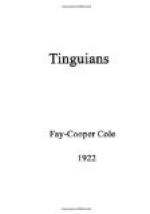Nowadays the couple goes to the home, prepared by the groom and his parents, as soon as it is ready, but the tales indicate [87] that in former times they lived for a time with the boy’s parents. They are accompanied by the groom’s mother, and go very early in the morning, as they are then less apt to receive bad signs from the birds. The girl carries her sleeping mat and two pillows; but before she has deposited these in her new dwelling, she seats herself on the bamboo floor with her legs stretched out in front. It then becomes necessary for the groom to present her with a string of agate beads equal in length to the combined width of the bamboo slats which she covers. Before she can eat of her husband’s rice, he must give her a string of beads, or she will become ill; she may not open his granary until a like present has been given, or the resident spirit will make her blind; neither may she take food from the pots or water from the jars, until other beads have been presented to her.
If the girl comes from another village, it is customary to make a payment to her parents for each stream crossed on the journey to the new home; another is demanded before she goes up the house ladder, and still others when she enters the house, and her belongings are brought in. [88]
A common occurrence in Ba-ak and the San Juan district is for the parents of the girl to spread rows of baskets, Chinese plates or jars on the floor and to offer them to the groom. Before he can accept them, he must make a return gift of money, beads, and the like for each one. It is explained by the elders that, when the young people see all the gifts spread out on the floor, they will appreciate the expense involved, and will be less likely to separate.
If at any time the relatives of the girl have reason to doubt the husband’s affection, they go to his home, and hold a gathering known as nagkakalo-nan. They place a pig, a jar, and a number of baskets on the floor; and the husband is obliged to exchange money and other gifts for them, if he desires to convince the people of his continued love. After the pig has been served as food, the old men deliberate; and should they decide that the relatives have erred, they assess the whole cost of the gathering to the plaintiffs, and return the gifts. If the charge is sustained, the relatives recover the price of the pig, and retain the articles received in exchange for the baskets and dishes.
Divorce is not uncommon, and is effected by a council similar to that just described. An attempt to reconcile the couple is made, but if that fails, the old men decide who is at fault, and assess the expenses of the gathering to that one. If blame attaches to the husband, he must complete any part of the marriage price still due; but if the woman is guilty, her parents and relatives must return the gifts distributed at the time of the engagement. The chief causes for divorce are cruelty or laziness on the part of the man, or unfaithfulness of the woman.




